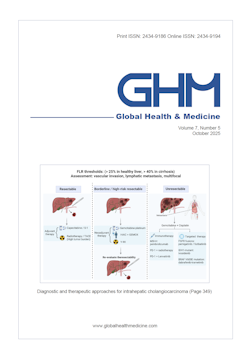Global Health & Medicine 2022;4(3):152-158.
The importance of an eating disorder treatment support center in Japan: A survey from 2017 to 2020
Kawai K, Kojima Y, Yamamoto Y, Fujimoto K, Tamura N, Oya T, Tachimori H
We investigated the impact of medical collaboration between the Chiba Eating Disorder (ED) Treatment Support Center (CSC) in Chiba Prefecture and the ED treatment center at Kohnodai Hospital. We calculated the number of consultations performed by the CSC and referral rate to other medical facilities from October 2017 to March 2020, as well as the clinical characteristics of the patients treated at our hospital from April 2016 to March 2020. Data on duration of hospitalization and increase in body mass index (BMI) during hospitalization were recorded. Patients were divided into all of the Japan and Chiba Prefecture groups. Data were evaluated by Poisson's regression analysis or one-way analysis of variance. A p-value < 0.05 was considered significant. The 2019 data served as reference values. Our data demonstrated that while the number of CSC consultations increased (2017:201, 2018:547, 2019:552) annually, the number of hospitalizations for EDs decreased (197, 194, 134, respectively). In comparison, the number of outpatient consultations for EDs across all of Japan peaked in 2018 and decreased significantly thereafter (2016:110, 2017:139, 2018:193, 2019:142). After the CSC was established, the number of patients treated in our department decreased as expected. Patients with anorexia nervosa (AN) who were treated on an outpatient basis across all of Japan were younger in 2019 (27.0 ± 1.2) than in 2018 (31.9 ± 1.2). Severe cases had better outcomes, and there was a significant increase in BMI of inpatients with AN in both groups. Overall, the activities of such ED treatment support center promoted successful treatment of severe ED cases.
DOI: 10.35772/ghm.2021.01104







